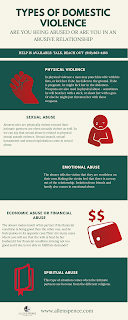Types of Domestic Violence

Domestic violence as its name defined it is the fight in which the intimate partners &couples and family members are being involved. Sometimes it is referred to as domestic abuse. Domestic violence occurs in all cultures, religions every kind of people which comes from any kind of economic and racial background. Physical, sexual, economic, or psychological abuse directed towards one's spouse, partner, or other family members within the household called domestic violence.